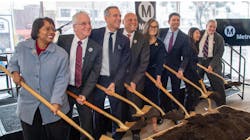L.A. Metro celebrates groundbreaking for advanced utility work on first segment of estimated $1.6 to $2 billion East San Fernando Valley light rail project
Los Angeles County Metropolitan Transportation Authority (L.A. Metro) celebrated the groundbreaking for advanced utility work on the first segment of the estimated $1.6 to $2 billion East San Fernando Valley light- rail project, the first rail line to be built in the Valley since the original Metro Red Line subway was extended to North Hollywood in 2000.
The new 6.7-mile light- rail line will connect the communities of Van Nuys, Panorama City, Arleta and Pacoima along Van Nuys Boulevard, one of the Valley’s busiest corridors. Another 2.5-mile segment is also planned to further extend the rail line from Pacoima to the Sylmar/San Fernando Metrolink Station. Design options for that project segment are now under study and will be built in a second construction phase.
L.A. Metro has issued a $9-million contract to W.A. Rasic Construction Company, Inc., of Long Beach to begin relocating existing Los Angeles Department of Water and Power vaults and associated conduit infrastructure along Van Nuys Boulevard in advance of major construction. L.A. Metro anticipates awarding its main construction contract early next year. The first rail segment between Van Nuys and Pacoima is scheduled to open between 2028 and 2030.
The start of advanced utility work marks a significant new milestone in L.A. Metro’s goal to bring street-running, local stop rail service back to the San Fernando Valley after 70 years. The last Pacific Electric Red Cars discontinued service along Van Nuys Boulevard in 1952.
L.A. Metro’s new rail line is planned to connect with both the Van Nuys Metrolink/Amtrak Station, as well as the Metrolink station at Sylmar/San Fernando to provide L.A. Metro transit customers with greater interregional connectivity.
The rail line’s first construction phase will travel along the median of Van Nuys Boulevard and include 11 new stations that will connect the cities of Van Nuys, Panorama City, Arleta and Pacoima. Destinations available along the new line will include the Van Nuys Civic Center, Panorama Mall, Van Nuys multi-residential housing complexes and Arleta High School, among others. The rail line will also provide key linkages with L.A. Metro bus lines, including the G Line (Orange) in Van Nuys and municipally operated bus lines.
The second planned phase of the rail line will turn northwest on the L.A. Metro-owned right-of-way along San Fernando Road and connect to the City of San Fernando, adding three new stops there.
With the construction of this line, L.A. Metro aims to improve transit equity for Valley commuters. The population of the project corridor itself is lower income and highly transit dependent. L.A. Metro’s new rail line is expected to bring cost-effective mobility options and greater access to opportunity to its residents.
The East San Fernando Valley Light Rail Transit Project is just one of the transit improvements L.A. Metro has planned to improve mobility in the San Fernando Valley over the next 10 years. Other projects include:
- The North San Fernando Transit Corridor Project
- The G Line Improvements Project
- The Sepulveda Transit Corridor Project
Projects are partially funded through L.A. Metro’s local Measure M voter-approved sales tax measure, which funds transportation improvements throughout Los Angeles County.
“Bringing light rail to this part of the city will do more than just help clean our air and give people a new way to get around without traffic. It will connect two halves of our city and serve as a major step toward redefining the car culture that has long shaped Los Angeles,” said Los Angeles Mayor Eric Garcetti.
“This new rail line will bring a whole new opportunity to thousands of hardworking families in the East Valley by giving them convenient, affordable access to work, school and shopping,” said L.A. City Council President and Metro Board Member Paul Krekorian. “As promised in Measure M, this project will change how the San Fernando Valley connects to our larger regional transit system. The addition of 11 new transit stations will create commercial opportunities along the entire route, generating employment and improving the quality of life for the entire community.”
“We are excited to begin delivering on our promise to bring light rail back to the Valley,” said Metro CEO Stephanie Wiggins. “The East San Fernando Valley line will serve a critical transportation need for residents and will be an important link in a network of improvements we’re building all over the San Fernando Valley.”


